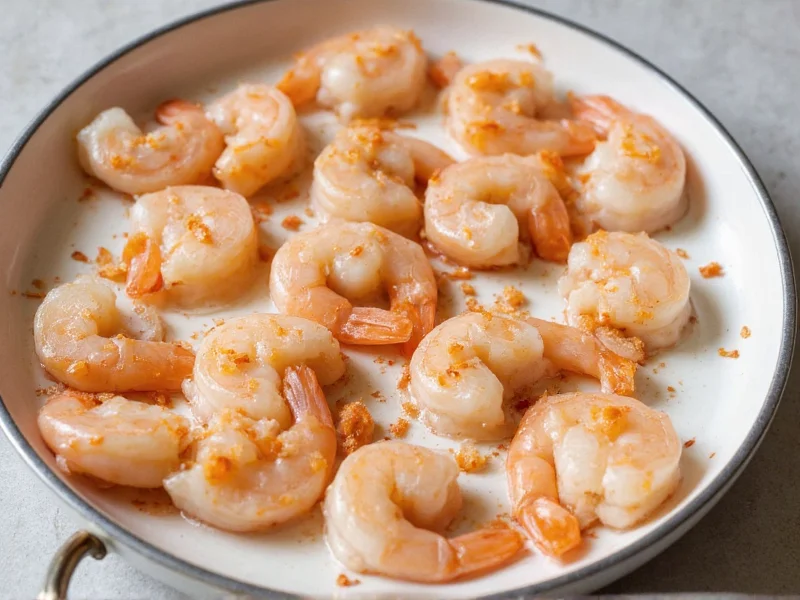Properly seasoning raw shrimp transforms this delicate seafood from bland to extraordinary while preserving its natural sweetness. Unlike heartier proteins, shrimp requires careful seasoning balance—too little leaves it flavorless, while too much overwhelms its subtle taste. The key lies in understanding shrimp's unique protein structure and how it interacts with different seasoning components.
Why Shrimp Seasoning Requires Special Attention
Shrimp's delicate muscle fibers react differently to seasonings compared to other proteins. Salt draws out moisture through osmosis, which can make shrimp mushy if applied too early or in excessive amounts. Acidic ingredients like citrus or vinegar begin the 'cooking' process through denaturation—a phenomenon called ceviche-style preparation that's desirable in some dishes but problematic when planning to heat the shrimp.
Essential Components of Shrimp Seasoning
Creating balanced shrimp seasoning involves four key elements working in harmony:
| Component | Purpose | Recommended Amount (per pound) | Application Timing |
|---|---|---|---|
| Salt | Enhances natural flavor, helps retain moisture | ¾-1 tsp kosher salt | 15-30 min before cooking |
| Acid | Brightens flavor, cuts richness | 1 tbsp lemon/lime juice | Immediately before cooking |
| Aromatics | Adds complexity and depth | 2-3 garlic cloves, 1 tbsp herbs | 15-30 min before cooking |
| Spices | Provides warmth and character | ½ tsp paprika, cayenne, etc. | Immediately before cooking |
Step-by-Step Seasoning Process
Follow this professional technique for perfectly seasoned shrimp every time:
- Prepare the shrimp: Pat raw shrimp completely dry with paper towels—moisture prevents proper seasoning adhesion
- Initial seasoning: Toss with salt, pepper, and dry spices (like paprika or cumin) in a non-reactive bowl
- Refrigerate: Let sit uncovered in the refrigerator for 15-30 minutes to allow flavors to penetrate
- Add aromatics: Mix in minced garlic, herbs, or other fresh ingredients 10 minutes before cooking
- Final touch: Add acid (lemon juice or vinegar) and oil just before cooking to prevent texture changes
Popular Shrimp Seasoning Combinations
Experiment with these chef-recommended blends for different culinary applications:
Mediterranean Garlic-Herb Blend
Ideal for grilling or sautéing, combine 1 pound shrimp with 2 minced garlic cloves, 1 tablespoon chopped fresh parsley, 1 teaspoon dried oregano, ½ teaspoon lemon zest, 1 tablespoon olive oil, salt, and pepper. Refrigerate 20 minutes before cooking.
Cajun Spice Rub
For blackened or grilled shrimp, mix 1 tablespoon paprika, 1 teaspoon garlic powder, ½ teaspoon cayenne, ½ teaspoon thyme, 1 teaspoon onion powder, salt, and black pepper. Apply to shrimp 15 minutes before high-heat cooking.
Asian-Inspired Marinade
Create an umami-rich coating with 1 tablespoon soy sauce, 1 teaspoon sesame oil, 1 teaspoon grated ginger, 1 minced garlic clove, and 1 teaspoon honey. Marinate no longer than 20 minutes to prevent texture degradation.
Food Safety and Quality Considerations
When seasoning raw shrimp, follow these critical safety guidelines:
- Always keep shrimp refrigerated below 40°F (4°C) until ready to cook
- Never reuse marinade that contacted raw shrimp unless boiled for 2+ minutes
- Discard shrimp left at room temperature longer than 2 hours (1 hour in hot conditions)
- Use non-reactive containers (glass or plastic) for marinating—avoid aluminum
- Don't marinate shrimp in acidic ingredients longer than 30 minutes
Common Seasoning Mistakes to Avoid
Even experienced cooks make these shrimp seasoning errors:
- Over-salting: Shrimp naturally contains sodium—use less salt than you would for chicken or beef
- Early acid application: Adding citrus too early turns shrimp mushy through enzymatic action
- Inconsistent coating: Not tossing shrimp thoroughly leaves some pieces under-seasoned
- Over-marinating: More than 30 minutes in any liquid marinade damages texture
- Using dried herbs exclusively: Fresh herbs provide brighter flavor that complements shrimp's delicacy
Seasoning for Different Cooking Methods
Tailor your seasoning approach based on your cooking technique:
- Grilling: Use robust seasonings with oil to prevent sticking; add delicate herbs after cooking
- Sautéing: Pre-season with salt and pepper, then finish with butter and fresh herbs in the pan
- Boiling: Season cooking water generously since shrimp absorbs flavor during cooking
- Baking: Create a paste with oil and seasonings to adhere to shrimp during dry heat exposure
Professional Tips for Flavor Enhancement
Elevate your shrimp seasoning with these chef secrets:
- Add a pinch of sugar to balance acidity in citrus-based seasonings
- Toast whole spices before grinding for deeper flavor in dry rubs
- Use shrimp shells to make flavorful stock for finishing sauces
- Chill seasoned shrimp uncovered for 10 minutes before cooking for better sear
- Finish with fresh acid (lemon juice) after cooking for brighter flavor
Frequently Asked Questions
Can I season shrimp overnight for more flavor?
No, seasoning raw shrimp overnight will damage its texture. Salt draws out moisture causing mushiness, while acidic ingredients begin 'cooking' the shrimp. Maximum marinating time is 30 minutes for acidic marinades and 1-2 hours for dry rubs.
Should I remove shrimp from marinade before cooking?
Yes, always pat shrimp dry after marinating. Excess liquid prevents proper searing and causes steaming instead of browning. Remove from marinade, place on paper towels, and gently pat dry before cooking for best results.
What's the best salt for seasoning raw shrimp?
Kosher salt is ideal for seasoning raw shrimp because its larger crystals dissolve slowly and distribute more evenly. Avoid fine table salt which can over-salt shrimp quickly. Use approximately ¾-1 teaspoon per pound of shrimp for optimal flavor without texture damage.
Can I use frozen shrimp for seasoning?
Yes, but only after proper thawing. Thaw frozen shrimp overnight in the refrigerator, then pat completely dry before seasoning. Never season frozen or partially frozen shrimp as surface moisture prevents proper seasoning adhesion and creates steam during cooking.
How do I fix over-seasoned shrimp?
If shrimp is over-salted, rinse briefly under cold water and pat dry. For excessive spice, create a quick dairy-based dip (yogurt or sour cream with herbs) to serve alongside. Unfortunately, once shrimp has absorbed too much seasoning, you cannot fully reverse it—proper timing and measurement are crucial for best results.











 浙公网安备
33010002000092号
浙公网安备
33010002000092号 浙B2-20120091-4
浙B2-20120091-4